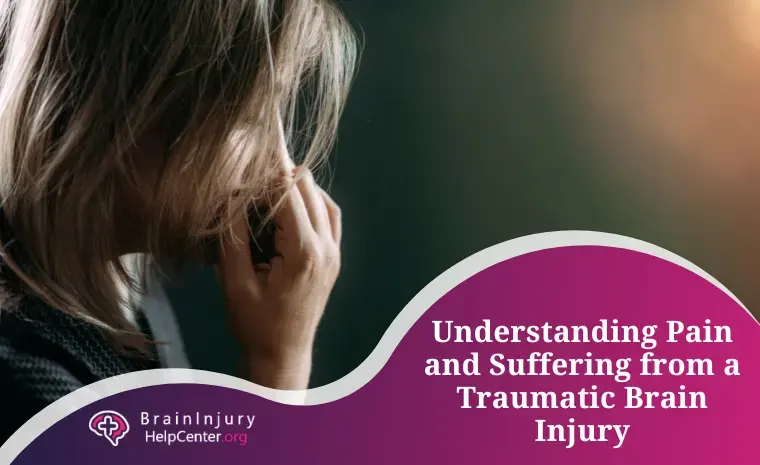Pain can be an uncomfortable experience that may vary in intensity. Everyone has a different response to pain, and it can have a major impact on various aspects of life, such as sleep, mood, behavior, and how the body functions.
Moreover, these factors can intensify one’s perception of pain, making it more noticeable. This is especially true when dealing with pain and suffering from a traumatic brain injury.
Those who suffer from a traumatic brain injury may experience acute or chronic pain in the days, weeks, and months following the incident. Brainline reports that even years after sustaining a brain injury more than 50% of patients suffer from chronic pain.
In this article, we will discuss:
- What is a traumatic brain injury?
- What is chronic pain and how does it affect TBI patients?
- Common types of pain after a traumatic brain injury
- How does this pain affect TBI victims?
- How to manage pain from a TBI
What is a Traumatic Brain Injury (TBI)?
The American Association of Neurological Surgeons (AANS) defines a traumatic brain injury (TBI) as a disruption to the normal function of the brain that is caused by a blow, bump, or jolt to the head. Closed head injuries are usually caused by an external jolt or blow while penetrating injuries involve objects piercing directly into the brain tissue.
The Centers for Disease Control and Prevention (CDC) reports that over 200,000 TBI-related hospitalizations occurred in 2019. The CDC also shares that males were more likely to be hospitalized than females.

What is Chronic Pain and How Does it Affect TBI Patients?
Pain is an indication that something has happened, or that something is wrong. Acute pain is pain that occurs from an injury that is healing. This pain goes away when there is no longer anything causing the pain. If pain is ongoing past a period of three months, it can be classified as chronic pain.
As previously mentioned, victims of a TBI are more likely to experience chronic pain. There is rarely an immediate solution for this type of pain, and medications that are used to treat acute pain often don’t work as effectively.
Non-prescription drugs, such as ibuprofen, aspirin, and acetaminophen, may not be effective in providing relief from chronic pain. Additionally, long-term usage of any medication can lead to dependence and might damage the kidneys or liver.
Common Types of Pain After a Traumatic Brain Injury
To help in understanding pain and suffering from a traumatic brain injury, it is best to familiarize oneself with some of the most common types of TBI-related pain patients suffer from:
Neurological or Nerve Pain
The brain and nervous system are responsible for interpreting pain signals that arise from tissue damage or injury. Depending on the type of nerve affected, this pain may be described as a shooting, burning, hot or cold sensation; or cause numbness or tingling in limbs.
To help manage this TBI-related pain, health care providers may prescribe special medication. The feeling of pain may also be caused by chemical changes in the brain.
Spasticity
Spasticity is a condition characterized by an abnormally high increase in muscle tone or stiffness in the muscle. This may cause interference with movement, and speech can cause pain or discomfort.
Spasticity may not cause pain in and of itself, but it can lead to sensations that are uncomfortable or painful. It may cause muscles to stay flexed and may cause them to shake uncontrollably. With time, spasticity can cause muscles to become shorter and tighter, causing discomfort. This may result in pain for the individual.
Headache
Headaches are some of the most common symptoms of brain damage. These are commonly experienced following an injury. Some TBI patients may experience a headache immediately after sustaining their injury. For others, the onset of headaches can start weeks or months after the injury. TBI patients may experience chronic migraines, tension headaches, or cervicogenic headaches.
Sleep
TBI patients with chronic pain often experience sleeping problems. A lack of sleep can cause an increase in pain. Common sleep disorders such as insomnia are very commonly caused by chronic pain. The Mayo Clinic shares that staying active and limiting caffeine is effective in the treatment of sleep disorders.
Not all pain is the same, this can vary depending on the cause. Two people may suffer from the same kind of pain, but they can each experience it in different ways. Each person’s sensation and perception of their pain may be unique. Post-TBI pain sensations may feel like the following:
- Sharp, mimicking a bee sting
- Hot or burning sensation
- Pressure, similar to squeezing
- Tingly, like a leg that has fallen asleep
- Dull pain that becomes worse with movement
- Throbbing pain that ranges from more or less severe
- Numb or decreased sensation
How Does This Pain Affect TBI Victims?
After suffering from a severe head injury, a patient’s quality of life is greatly disrupted. Even a mild injury can cause cognitive dysfunctions. It is common for patients to experience fatigue, cognitive deficits, psychiatric disorders (such as anxiety and depression), and problems sleeping.
Dealing with TBI-related pain on top of these may make patients feel worse, and vice versa. Sometimes, the cycle that arises from this experience can make it difficult to determine if the pain is the cause of the patient’s discomfort or the effect of their injury.
The following are the effects of pain and suffering from a traumatic brain injury:
PTSD
An incident that leads to a traumatic brain injury, such as an accident, may cause patients to develop post-traumatic stress disorder (PTSD). PTSD may cause TBI victims to be stressed or afraid even during the absence of danger.
Sufferers of PTSD also experience flashbacks and feel as if they are reliving the event. This may lead them to become avoidant of situations that remind them of their trauma, easily startled, and experience changes in their emotional and mental state. Both PTSD and pain in patients can prompt them to avoid certain activities and spaces, causing them to isolate themselves, and worsening their symptoms.
Fatigue
A lack of sleep or being in constant TBI-related pain for a long period of time can cause fatigue. Fatigue can make it difficult to do normal everyday things, affecting your daily life. This fatigue can also cause difficulties with cognitive performance, such as memory and thinking skills.
Depression
There is a strong link between experiencing pain and depression. The effects of pain can be draining and have a negative impact on your emotional state. Prolonged suffering can lead to unpleasant consequences like insomnia and stress, which may in turn cause depression.
The disabling effects of TBI-related pain can lead to feelings of inadequacy, particularly if it causes a person to be unable to earn money or take part in social occasions and hobbies. This can have a negative effect on their self-esteem and mental status.
Anxiety
Stress commonly accompanies chronic pain, and stress is a major cause of anxiety. Anxiety can cause chronic pain to worsen. TBI patients suffering from anxiety may become hypersensitive to pain, causing them to shift most of their focus onto the pain, making them feel even worse.
Anxiety also creates its kind of pain, such as chest pain from panic attacks, chronic headaches due to stress, and muscle pain caused by constant tension.
How to Manage Pain From a TBI
To deal with post-TBI pain, many medical professionals may prescribe medication to aid TBI victims, such as muscle relaxants and numbing medication. However, depending solely on this medication may not be beneficial for your health in the long run.
As a TBI patient, it is important to remember that there are other ways to help you manage the pain. You may be recommended by your doctor to cut out caffeine, alcohol, and tobacco from your diet. You may also be required to see a physical therapist to help you with muscle pain.
Daily exercise, a healthier diet, learning to avoid stress, and alternative treatments to help you relax are also some ways in which you can slowly work towards better pain management.
Help is Available
Dealing with pain and suffering from a traumatic brain injury can require a great deal of medical care. Not only can this type of injury affect you mentally, emotionally, and physically, but it may also create a great financial burden for you and your family.
You do not have to deal with this alone. At the Brain Injury Help Center, we offer the resources, medical care, and legal aid to help you cope with your injury. Our professionals can assist you in calculating non-economic and punitive damages for your personal injury claims.
Get the fair settlement you deserve with the help you need! Contact us for a free consultation.









